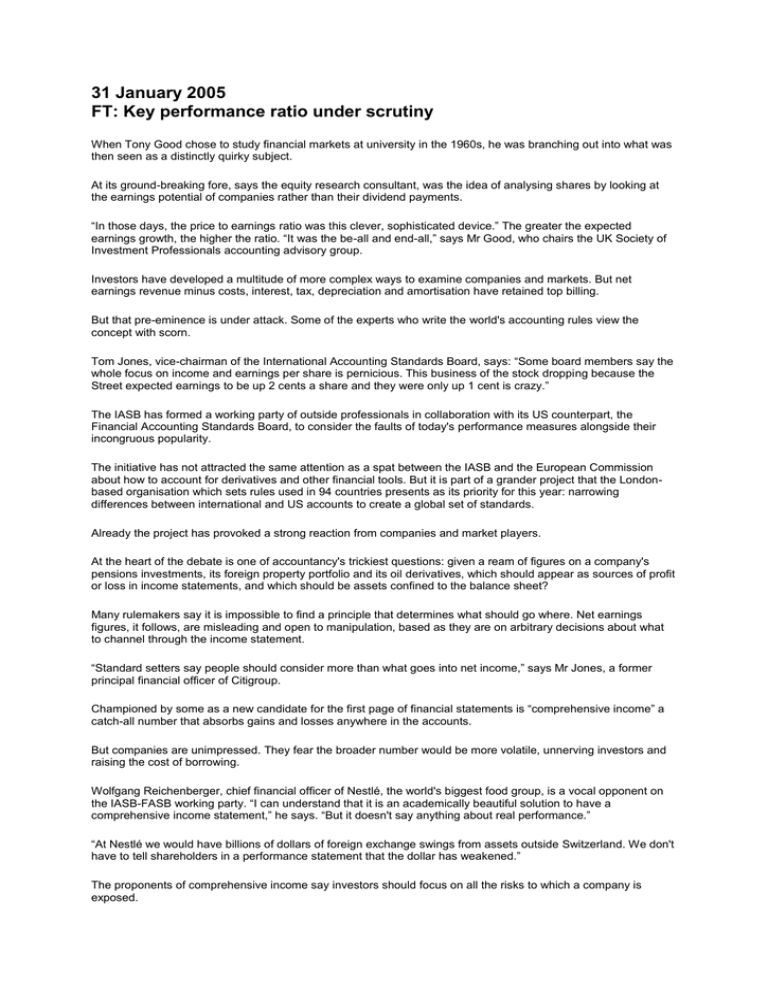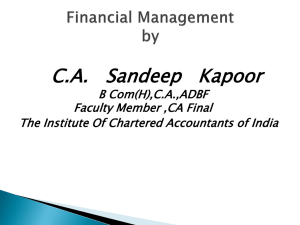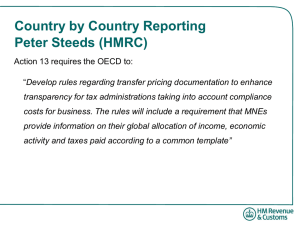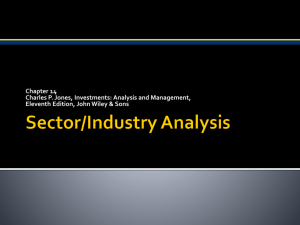31 January 2005 FT: Key performance ratio under scrutiny
advertisement

31 January 2005 FT: Key performance ratio under scrutiny When Tony Good chose to study financial markets at university in the 1960s, he was branching out into what was then seen as a distinctly quirky subject. At its ground-breaking fore, says the equity research consultant, was the idea of analysing shares by looking at the earnings potential of companies rather than their dividend payments. “In those days, the price to earnings ratio was this clever, sophisticated device.” The greater the expected earnings growth, the higher the ratio. “It was the be-all and end-all,” says Mr Good, who chairs the UK Society of Investment Professionals accounting advisory group. Investors have developed a multitude of more complex ways to examine companies and markets. But net earnings revenue minus costs, interest, tax, depreciation and amortisation have retained top billing. But that pre-eminence is under attack. Some of the experts who write the world's accounting rules view the concept with scorn. Tom Jones, vice-chairman of the International Accounting Standards Board, says: “Some board members say the whole focus on income and earnings per share is pernicious. This business of the stock dropping because the Street expected earnings to be up 2 cents a share and they were only up 1 cent is crazy.” The IASB has formed a working party of outside professionals in collaboration with its US counterpart, the Financial Accounting Standards Board, to consider the faults of today's performance measures alongside their incongruous popularity. The initiative has not attracted the same attention as a spat between the IASB and the European Commission about how to account for derivatives and other financial tools. But it is part of a grander project that the Londonbased organisation which sets rules used in 94 countries presents as its priority for this year: narrowing differences between international and US accounts to create a global set of standards. Already the project has provoked a strong reaction from companies and market players. At the heart of the debate is one of accountancy's trickiest questions: given a ream of figures on a company's pensions investments, its foreign property portfolio and its oil derivatives, which should appear as sources of profit or loss in income statements, and which should be assets confined to the balance sheet? Many rulemakers say it is impossible to find a principle that determines what should go where. Net earnings figures, it follows, are misleading and open to manipulation, based as they are on arbitrary decisions about what to channel through the income statement. “Standard setters say people should consider more than what goes into net income,” says Mr Jones, a former principal financial officer of Citigroup. Championed by some as a new candidate for the first page of financial statements is “comprehensive income” a catch-all number that absorbs gains and losses anywhere in the accounts. But companies are unimpressed. They fear the broader number would be more volatile, unnerving investors and raising the cost of borrowing. Wolfgang Reichenberger, chief financial officer of Nestlé, the world's biggest food group, is a vocal opponent on the IASB-FASB working party. “I can understand that it is an academically beautiful solution to have a comprehensive income statement,” he says. “But it doesn't say anything about real performance.” “At Nestlé we would have billions of dollars of foreign exchange swings from assets outside Switzerland. We don't have to tell shareholders in a performance statement that the dollar has weakened.” The proponents of comprehensive income say investors should focus on all the risks to which a company is exposed. The alternative measure, they claim, could make it more difficult to conceal derivatives losses such as those that recently sank China Aviation Oil. “What has happened has happened,” says one IASB member. “Investors should know about it.” For equity analysts, comprehensive income promises a flood of potentially useful data, but one that could be overwhelming. Stephen Cooper, managing director of the global valuation group at UBS, admits that net earnings are not the definitive measure of corporate performance. “The fact earnings per share is on the front page of our reports doesn't mean it's all we look at. Earnings is merely a starting point in discussions with a company. You can't go into a meeting with a list of 100 numbers.” Mr Jones at the IASB emphasises that the standard setters are garnering outside opinions and have decided nothing. But one conclusion is already clear: setting accounting standards is no way to make friends. By Barney Jopson



